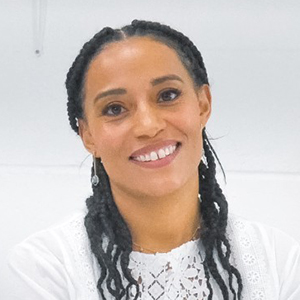
25 September 2023
In her second post of a three-part series exploring the role of institutional whiteness in executive coaching, Bernice Hewson, a coach, racial equity scholar and anti-racism educator, shares further findings from her master’s dissertation exploring how coaching can uphold and reproduce racial inequalities, while simultaneously seeking to challenge them. See the first and third blog posts.
In my previous post, I explored why antiracism work is so challenging, and shared how the antiracism discourse in coaching, often spearheaded by a diversity and inclusion dialogue, paradoxically upholds whiteness. This post shares additional findings regarding the problematic role of common sense, as well as the role of dissonance and innocence in maintaining racial inequity.
The danger of relying on common sense when tackling racial inequity
In the coaching industry, there is a desire to be inclusive, and through various ethical codes, coaching policies, and competency frameworks, it could be said that this is assumed to be the case. However, recent research brought this assumption into doubt, identifying that BIPOC coaches[1] are vastly underrepresented globally, confirming that the global coaching ecosystem mirrors both the racial ordering and racial inequity that has been witnessed in the corporate world (Passmore, 2021).
This disparity between good intentions and the reality raises the question of why this might be. What could be a reasonable explanation? I invite you to take a moment and reflect on how you might rationalise these findings.
The findings in this study suggest that the racial inequity may be due to black and brown coaches lacking appropriate qualifications, lacking funding for coach training, or coming from underprivileged backgrounds. Perhaps this is also where your thinking led you?
These could be framed as ‘common sense’ modes of thought. Common sense ideas and beliefs can be understood as commonly yet vaguely held beliefs, and so they almost go unnoticed, existing under the radar – everywhere and nowhere. These beliefs are often backed up with little evidence, yet become important, powerful ideas because of their common-ness and the ease with which they spread. Their dominance leaves little space for an alternative narrative.
However, when we rely on uncritical, common sense modes of thought, there is a risk that stereotypes such as those just described can be adopted as a rationale to explain the lack of black and brown coaches in the profession (Wodak & Reisigl).
An uncritical examination of the disparities falsely leads us towards a discourse on representation, suggesting that addressing presumed barriers to entry (through reduced fees and admission requirements for black and brown coaches) may serve to address the inequity. But as we examined in the first blog, the conscious inclusion of non-white individuals into the workplace not only fails as a tactic to address racial inequity, but also preserves the white institutions’ control of the diversity agenda.
Addressing common sense beliefs proves complex because there is often a thread of truth running through these ideas, making them more compelling. Applying solely common sense modes of thought uncritically provides a convenient explanation that diverts our attention away from what else might be at work. For example, in relation to coaching, research data shows that there are fewer black students attending and succeeding at UK universities (Weekes-Bernard, 2010), which would appear to support the premise that black and brown coaches lack the appropriate qualifications to enter the profession.
However, this conclusion grossly fails the industry and those connected to it. As Roche and Passmore identified, it dismisses the experiences of those black and brown coaches excluded from corporate coaching pools, consequently limiting the access to the prestige, experience and remuneration attached to working in these spaces. Similarly, it fails to recognise that black and brown coaches entering the profession show higher drop-out numbers, conceivably because the industry has failed to communicate that they ‘belong’. (Roche & Passmore, 2022). To effectively challenge inequity requires a critical and complete examination of the problem.
The essential ingredients in upholding racial inequity: Innocence and dissonance
We shouldn’t be surprised that the coaching industry mirrors the racial ordering and hierarchy seen elsewhere, when coaching operates as a microcosm of a broader capitalistic society that is dependent on racism and racialisation.[2] Yet there remains a dissonance between the data, the assertion that ‘we stand against racism’,[3] and the actions and behaviours witnessed in my research. The discourse reveals an underlying belief that ‘we’ (as members of the coaching ecosystem) trust in the coaching profession, in the membership bodies, and the coach training providers to do the right thing in relation to racial equity, which perhaps absolves individuals from taking action in pursuit of change.
How conscious we are to this dissonance, I suggest, is part of the problem. White innocence is a concept coined by Wekker (2016), describing the Dutch way of being in the world, free of ‘race’, and by implication racism. The concept is seen as an integral ingredient of the dominant white Dutch self-identity and has been adopted in critical whiteness studies to detail its role in upholding racial inequity.
My research findings suggest that white innocence is similarly integral to the self-image of coaching – a helping profession, founded on principles of ethics, confidentiality, and mutual respect, a space that is free of racism, a profession that would not intentionally cause harm. The discourse imagines the coaching profession as a young adult who would mature given time, and one that we could wholeheartedly have faith in to address its shortcomings. Examining this through the lens of whiteness illustrates the function of white innocence in maintaining whiteness within the coaching profession, through a dialogue that fails to challenge the status quo.
If coaching is to drive racial equity, there is a requirement to acknowledge the shared role that dissonance and innocence play in obfuscating responsibility and accountability for those involved in shaping the customs and practices of the coaching profession. We know that professions and institutions do not exist as things in themselves, and as Ahmed cautions, it is important that we do not reify them, reminding us that they ‘become given as an effect of the repetition of decisions over time, which shapes the surface of institutional spaces’ (Ahmed, 2006).
The coaching profession and its institutions are shaped by the academic research invested, the quality of coach training delivered, and the recruitment practices employed. It is important that we remain awake to there not being an evolutionary process at play here. Rather, there is a set of cumulative actions, decisions and practices that defines and reinforces the characteristics of coaching today.
Transforming our approach to racial equity: Where to start?
It’s hard to reconcile that the things we do or the thoughts we have uphold the very things we stand against. But if we are to drive meaningful change, we are all required to look inwards first. This is what antiracism work asks of us.
By developing our knowledge and critical thinking skills, we can resist the common sense modes of thinking that pathologise the Other, telling us that the problem lies elsewhere. Through acknowledging that the coaching profession, like most other professions, employs processes and practices that uphold racial inequity – and most importantly, that their effectiveness in doing so is compounded by our failure to look in the mirror – we can take responsibility for the role that we play.
Only through really knowing our full selves can we begin to change ourselves, and subsequently change the spaces that we are working within. Racial equity is not a state that is preordained. It will require transformation at every level, starting with each of us.
This blog post invites further opportunity for reflection on this journey.
Reflective practice invitation
Read these statements aloud.
How do you feel about them? What sensations do you notice in your body?
• Even though I may not fully understand the challenge, I accept that the racial inequity that we see within coaching is something that I can influence.
• I recognise that to make meaningful change I need to expand both my knowledge and skills in critical consciousness.
• I recognise that doing nothing is part of the problem.
My research seeks to interrupt the dominant narratives in coaching that preserves such whitening practices, with a view to equipping us to write new narratives that support a racially equitable future.
Notes
[1] BIPOC, refers to Black, Indigenous and other People of Colour who work as coaches in the coaching industry.
[2] Cedric Robinson (1983) described how racialised exploitation and capital accumulation are mutually constitutive and introduced a term, ‘racial capitalism’, to describe the interaction between racism and capitalism.
[3] On 15 September 2021, EMCC UK held the first professional body roundtable on ‘Racism in Coaching’, hosted by Coaching at Work. There was collective agreement among the professional coaching bodies that ‘We stand against racism’, and a recognition that it needs to be more than mere ‘tokenism’.
Blog series
Bernice Hewson is sharing specific results from her research, exploring how the whitening practices present in the coaching industry serve to uphold racial hierarchies, while simultaneously seeking to challenge them, in a series of blog posts entitled: Hidden in plain sight: Institutional whiteness in executive coaching. The three posts in the series explore:
How antiracist discourse in coaching paradoxically upholds whiteness
How common sense, dissonance and innocence can maintaining racial inequity
How whiteness is implicit in our coaching curriculum and ways of knowing as coaches

About Bernice Hewson
Bernice Hewson is a racial equity scholar, anti-racism educator and founder of Raising Racial Consciousness Ltd. She works with coach training providers and leadership teams to influence and drive racial equity throughout their organisations. She is passionate about supporting individuals and teams that have made a conscious commitment to deepen their understanding of racial equity and inclusion, supporting them to learn and unlearn in a non-judgmental space as they learn to find their voice.
Bernice has a master’s degree in Culture, Diaspora and Ethnicity from Birkbeck University and is an accredited EMCC Senior Practitioner.
Suggested books
To understand performativity in anti-racism work: Ahmed, S., 2012. On Being Included: Racism and diversity in institutional life. 1st Edition ed. London: Duke University Press.
To understand whiteness: Garner, S., 2007. Whiteness: An introduction. 1st Edition ed. London & New York: Routledge.
To understand the important of critical reflection and critical consciousness in coaching: Thompson, N. & Thompson, S. 2018. The Critically Reflective Practitioner. 2nd Edition. Palgrave.
Bibliography
Ahmed, S., 2012. On Being Included: Racism and diversity in institutional life. 1st Edition ed. London: Duke University Press.
Frakenberg, R., 1995. White women, Race matters: The Social construction of whiteness. In: Theories of race and racism. s.l.: Routledge, pp. 517-533.
Hunter, S. & van der Westhuizen, C., 2021. Routledge Handbook of Critical Studies in Whiteness. 1st Edition ed. s.l.: Taylor & Francis.
Matias, C. E. et al., 2014. What is Critical Whiteness Doing in OUR Nice Field like Critical Race Theory? Equity & Excellence in Education, 47(3), pp. 289-304.
Passmore, J., 2021. Future Trends in Coaching: Executive Report 2021, Henley-On-Thames: Henley Business School and EMCC International.
Robinson, C. J., 1983. Black Marxism: The Making of the Black Radical Tradition. 3rd ed. USA: University of North Carolina Press.
Roche, C., 2021. Speak Up. Speak Out. The Ethics Matter Podcast. June 2023: https://www.lifeflowbalance.co.uk/speak-up-speak-out-podcast/
Roche, C. & Passmore, J., 2022. Anti-racism in coaching: a global call to action. Coaching: An International Journal of Theory, Research and Practice, pp. 1-18.
Weekes-Bernard , D., 2010. Widening Participation and Race Equality, London: Runneymede Trust.
Wekker, G., 2016. White Innocence. 1st Edition ed. s.l.:Duke University Press.
Wodak, R. & Reisigl, M., 2015. The Handbook of Discourse Analysis. 2nd Edition ed. s.l.: John Wiley & Sons Inc.
Image by Parabol | The Agile Meeting Toolbox